National Gold Bank Note
National Gold Bank Notes were National Bank Notes issued by nine national gold banks in California in the 1870s and 1880s and redeemable in gold. Printed on a yellow-tinted paper, six denominations circulated: $5, $10, $20, $50, $100, and $500.[1] A $1,000 note was designed and printed but never issued.[2] During the issuing period of national gold banks (1871–83), the U.S. Treasury issued 200,558 notes[3] totaling $3,465,240.[1] Today, National Gold Bank Notes are rare in the higher denominations (and unknown on some issuing banks) with condition generally falling in the good-to-fine range.[nb 1] Approximately 630 National Gold Bank Notes are known to exist, and roughly 20 grade above "very fine".[4]
| (United States Of America) | |
|---|---|
| Value | $5, $10, $20, $50, $100, and $500 |
| Security features | None |
| Years of printing | 1870 – 1875 |
| Obverse | |
.jpg.webp) | |
| Design | Various |
| Design date | 1870s |
| Reverse | |
.jpg.webp) | |
| Design | Ornamental with an array of United States gold coins |
| Design date | 1870s |
History
The National Gold Bank Notes were authorized under the provisions of the Currency Act of July 12, 1870.[5] The series was a result of the California Gold Rush, where gold coins were preferred in commerce.[6] Ten national gold banks were charted, nine of them in California and one in Boston, Massachusetts.
The Kiddler Bank was the only bank to have $1,000 notes among others prepared, however, no notes circulated from the bank.[7]
Issuing banks
| Title | City | Charter | Date[9] | Denominations | Total issue |
|---|---|---|---|---|---|
| The Kidder National Gold Bank[nb 2] | Boston | 1699 | 15 Aug 1870 | 50, 100, 500, 1000[11] | $120,000[12] |
| The First National Gold Bank | San Francisco | 1741 | 30 Nov 1870 | 5, 10, 20, 50, 100, 500[11] | $1,185,000[12] |
| The National Gold Bank and Trust Company | San Francisco | 1994 | 3 Jun 1872 | 5, 10, 20, 50, 100, 500[13] | $853,750[12] |
| The National Gold Bank of D.O. Mills & Co. | Sacramento | 2014 | 19 Jul 1872 | 5, 10, 20, 50, 100, 500[13] | $270,450[12] |
| The First National Gold Bank | Stockton | 2077 | 27 Jan 1873 | 5, 10, 20, 50, 100[13] | $414,700[12] |
| The First National Gold Bank | Santa Barbara | 2104 | 7 May 1873 | 5, 10, 50, 100[14] | $80,000[12] |
| The Farmers National Gold Bank | San Jose | 2158 | 21 Jul 1874 | 5, 10, 20, 50, 100[14] | $242,590[3] |
| The First National Gold Bank | Petaluma | 2193 | 25 Sep 1874 | 10, 20, 50, 100[14] | $178,150[3] |
| The First National Gold Bank | Oakland | 2248 | 10 Apr 1875 | 10, 20[14] | $80,600[3] |
| The Union National Gold Bank | Oakland | 2266 | 20 May 1875 | 10, 20, 50, 100[14] | $40,000[3] |
Series overview
| Value | Image | Plate dates | Signatures[nb 3] | Remarks[nb 4] |
|---|---|---|---|---|
| $5 | 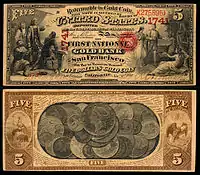 |
1870, 1872, 1873, 1874 | Edwin D. Morgan (cashier) and Ralph C. Woolworth (president)[15] |
427 reported |
| $10 | 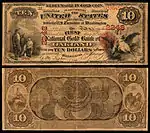 |
1870, 1872, 1873, 1874, 1875 | Galen M. Fisher (cashier) and Benjamin F. Ferris (president)[16] |
117 reported |
| $20 | 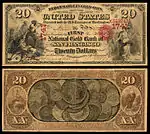 |
1870, 1872, 1873, 1874, 1875 | Edwin D. Morgan (cashier) and Ralph C. Woolworth (president)[15] |
71 reported |
| $50 | 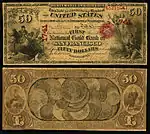 |
1870, 1874 | Edwin D. Morgan (cashier) and Ralph C. Woolworth (president)[15] |
7 reported[17] |
| $100 | 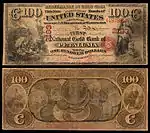 |
1870, 1873, 1874, 1875 | Henry H. Atwater (cashier) and Issac G. Wickersham (president)[18] |
9 reported[19] |
| $500 | None known | 1870, 1872 | Unknown[nb 5] | |
| $1,000 | None known | 1870 | Not issued[nb 6] | |
Footnotes
- "Any National Gold Bank Note in crisp new condition is practically unheard of and is an outstanding rarity. The general condition in which these notes are found is one of advanced circulation and notes in very fine or better condition are extremely rare."[2]
- The Kidder National Gold Bank ordered 250 notes which were returned (in full) to the comptroller of the currency's office.[10]
- On the notes illustrated.
- All population and issuance statistics cited are attributed to the National Bank Note Census and were retrieved mid-May, 2014.[4]
- $500 National Gold Bank Notes were issued by only three banks. Four notes have not been redeemed but to date none have been reported.[19]
- The $1,000 National Gold Bank Note was not circulated.
Notes
- Zerbe, Farran (1898). "National Gold Bank Notes". The Numismatist. The American Numismatic Association. 30 (1): 158. Retrieved 27 May 2014.
- Friedberg & Friedberg, 2010, p. 160.
- Huntoon, 1996, p. 126.
- "The National Bank Note Census". The National Currency Foundation. Retrieved 13 May 2014. Cite journal requires
|journal=(help) - "Collecting National Gold Bank Notes". www.numismaster.com.
- "National Gold Bank Notes". www.hokanson-coins.com. Retrieved 2012-06-05.
- About Paper Money - Large-size paper money - Early federal issues Coin World
- Friedberg & Friedberg, pp. 160–63.
- Huntoon, 1996, p. 121.
- Huntoon, 1996, p. 118.
- Huntoon, 1996, p. 122.
- Huntoon, 1996, p. 125.
- Huntoon, 1996, p. 123.
- Huntoon, 1996, p. 124.
- Annual Report of the Comptroller of the Currency (Report). Office of the Comptroller of the Currency. 1879. p. 750. Retrieved 14 May 2014.
- Annual Report of the Comptroller of the Currency (Report). Office of the Comptroller of the Currency. 1876. p. 756. Retrieved 14 May 2014.
- Friedberg & Friedberg, 2010, p. 162
- Annual Report of the Comptroller of the Currency (Report). Office of the Comptroller of the Currency. 1879. p. 749. Retrieved 14 May 2014.
- Friedberg & Friedberg, 2010, p. 163
References
- Friedberg, Arthur L.; Friedberg, Ira S. (2010). Paper Money of the United States: A Complete Illustrated Guide With Valuations (19th ed.). Coin & Currency Institute. ISBN 978-0-87184-519-1.
- Huntoon, Peter W. (1995). United States Large Size National Bank Notes. Society of Paper Money Collectors, Inc. ISBN 0-9648774-1-4.
- Annual Report of the Comptroller of the Currency (OCC) (Report). Office of the Comptroller of the Currency. 1876. Retrieved 14 May 2014.
External links
| Wikimedia Commons has media related to National Gold Bank Notes. |
- About Paper Money - Large-size paper money - Early federal issues Coin World
- Pictures of National Gold Bank Notes The Federal Reserve Bank of San Francisco